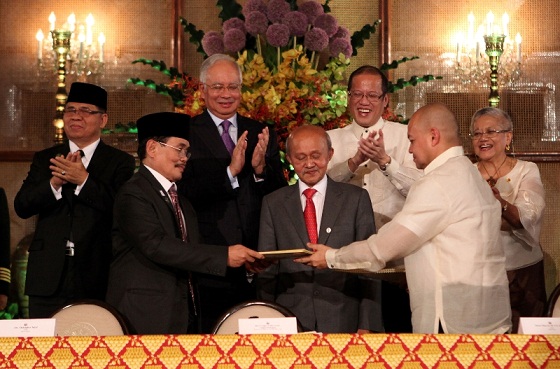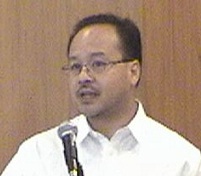By Raul C. Pangalangan
Philippine Daily Inquirer

One more not rise to a standing ovation for a trailer even before the movie is made, lest unrealistic expectations spoil the actual viewing. Similarly, the Framework Agreement with the Moro Islamic Liberation Front is a milestone for sure, but unrestrained hype may well derail peace in the end. The Framework says little but the public has been conditioned to believe it says everything. What will happen when our people check under the hood and discover what’s not there?
 Most importantly, the key Framework provisions each refer to an “Annex” that does not exist. This is not about missing footnotes but goes to the heart of a peace pact: What will be in the “Annex on Power Sharing,” “Annex on Wealth Sharing,” and “Annex on Transitional Arrangements”? How exactly will power and wealth be shared in the future? There can be no “just and lasting peace” unless we agree on these.
Most importantly, the key Framework provisions each refer to an “Annex” that does not exist. This is not about missing footnotes but goes to the heart of a peace pact: What will be in the “Annex on Power Sharing,” “Annex on Wealth Sharing,” and “Annex on Transitional Arrangements”? How exactly will power and wealth be shared in the future? There can be no “just and lasting peace” unless we agree on these.
When the Framework was first published online, I thought the missing annexes would soon follow. After all, the Supreme Court struck down the Memorandum of Agreement on Ancestral Domain in 2008 because, among other grounds, it lacked transparency. But the Framework signing has come and gone, and it is clear that those annexes still do not exist.
Even worse, each annex is declared to “form part of this Framework Agreement.” How can we consent in advance to terms that do not exist and retroactively write them into the Framework? This was the Supreme Court’s point exactly in 2008.
Analyzing what is in the Framework itself, I am concerned that the Bangsamoro’s relationship to our constitutional bodies remains unclear. For example, the Framework treats constitutional accountability for funds as a triviality. The government peacemakers’ website highlights that the porous auditing of Autonomous Region in Muslim Mindanao funds has been a real pain. Of the “850 million pesos allocated for infrastructure projects in ARMM’s 2010 budget, not one construction budget (sic) was completed.” It adds that “90 percent of ARMM’s funding was allocated to ‘Personnel Services’ and until now, that money has not been accounted for,” suggesting an orgy of ghost employees. To say that the ARMM has little to show for these funds is to be too kind.
Then why does the Framework now virtually exempt the Bangsamoro from the Commission on Audit’s reach? It says that the Bangsamoro “may create its own auditing body [for] funds generated … from external sources.” We’re talking about a lot of funds here, given US, EU and Muslim countries’ exuberance. The Agreement then mentions the COA’s power but limited only to funds held by “any government instrumentality, including GOCCs.”
This language is so slippery. It purports to affirm COA jurisdiction but it furtively lays the basis for the Bangsamoro government to access foreign funds without independent audit, while limiting the COA to locally generated funds. Worse, the term “instrumentality” is actually limited by the Administrative Code merely to “regulatory agencies, chartered institutions [like state universities and colleges] and GOCCs,” and excludes all the Cabinet departments and their bureaucracies.
In sum, the Bangsamoro gets a free pass to the expected bonanza from gung-ho foreign sponsors and, if the negotiators have their way, without even having to amend the Philippine Constitution.
Yet the Constitution is explicit that the COA shall have the power “to examine, audit, and settle all accounts [of] the Government, or any of its subdivisions, agencies, or instrumentalities” and “[n]o law shall be passed exempting any entity of the Government or its subsidiaries in any guise whatever.” Surely that includes the “new autonomous political entity” called the Bangsamoro and its in-house “auditing body.”
Even more sinister, notice a strange clause that occurs not once but twice in the Framework: The Bangsamoro rulers may “block grants and subsidies from the Central Government.” Say that again, please? Spurn manna from heaven? Why not, if the manna from abroad is more bountiful, and along the way, the better to strengthen the Bangsamoro government’s hand versus its component units, and weaken Manila’s hold.
The COA exemption and the Bangsamoro veto over Manila’s funding are not the only mysteries in the Framework. Sen. Miriam Defensor-Santiago insists that the Framework needs constitutional amendments because of the Bangsamoro shift to a “ministerial” and federal system of government. Sen. Panfilo Lacson asks whether the Bangsamoro will have a separate police force. Former Solicitor General Estelito Mendoza asks whether the Framework is even subject to the Constitution, which merits only one passing mention.
Last week, I pointed out the mischief in the term “asymmetric” to describe the relation between the Central and Bangsamoro governments. If they’re not equal, then who’s above and who’s below? The COA exemption demonstrates one ominous asymmetry: Foreign funds are COA-exempt, while local funds held by lowly “instrumentalities” are not.
Don’t get me wrong. We all want peace, and we must do right by our Muslim countrymen. But an overplayed agreement referring to nonexistent annexes is a shaky foundation for peace. Carving out a regional auditing body defies the historical record and is akin to setting the fox to guard the chicken coop.
After Edsa 1, the Filipino people thought hard and wrote down all their promises to future generations in our Constitution. In 2012, this covenant cannot be unraveled by unwritten promises. Let us instead be sure that all our vows for peace to Muslim and Christian alike are made crystal-clear before we place them alongside our Constitution.
I did not join in the applause yet because, as the author said, it’s just a framework and there are so much still to be threshed out.
The auditing aspect is a very serious matter especially based on the experience of Nur Misuari. Ang daming binuhos na pera which did not trickle down to the people.
I am for peace with our fellow Muslim brothers and I pray that this will lead to lasting peace.
Still, the framework is a positive step. Parang sobra lang ang hype.
Details (which the devils may rise) will be drawn from the Framework and will be Measured to the Test of Constitutionality before they will Be Agreed Upon..and just like any Autonomous Entity, it will have its own Government Within the Government…or it a Nation within a Nation..it will have its own Auditing body and the funds downloaded from the Central government will be the still under the watch of the Central Govt. Auditors..An Autonomous Entity is assumed after it has own established Basic Law to be a Responsible Self Governing entity…You can Compare it from an Independent State joining a Federation in a Reverse manner…Philippine Style. And it will be another one of the country’s pride if it will bear fruition, like the Edsa 1 that so impressed the whole world, but the euphoria was tempered by its failure to realise the expectations…
Hope for now, will wait till they give substance to the skeleton.
Initial observation ko lang, sobra yata bait nila sa Bangsamoro giving “free pass to the expected bonanza from gung-ho foreign sponsors and, if the negotiators have their way, without even having to amend the Philippine Constitution.”.
I think that the important thing is not the piece of paper, which symbolizes a basic agreement on how to go forward, but the SPIRIT of agreement that “we can do this”. In prior discussions, there was a lot of sniping and griping and heavy handed posturing. I don’t like the tone of this article because it tends more toward the sniping, too.
Framework is nothing but a propaganda.
Yeah, giving away Mindanao is good as long as you have that soft drink spirit with yellow bubble’s usual twisted minds.
I am for the lasting peace in Mindanao also, but the government should think a million times what kind of agreement they are entering into. Muslim rebels do not enter into an agreement with anybody if its not advantageous to them…Three most important aspects should be given utmost consideration in the agreement:
1. Power/Governance – By the very nature of their existence as rebels, they don’t want to be governed or be under the governance of the RP government. They want to have their own government and rule themselves the way they want it and have their own Constitution.
2. Fund – They want to receive money but they don’t want to be asked how they spent the money. They believe once the money is given to them it’s theirs. They don’t believe in accountability…What happened to the “Masagana 99” program of Marcos? It failed because although it was intended for farming or rice planting, Ammanah Bank loaned the money out to all applicants who used the money to buy “Ford Fierras” which they used as PUJ, and as capital to put up their own businesses. Fund from this program was never accounted for.
3. Gun- There will be no peace if these rebels will not be required to lay down their arms. This is impossible. For them gun is part of their lives. A rebel would trade his daughter for an Armalite Rifle. They would say, “You take away my gun, you take away my life.”
Penoy should reconsider his position because he is playing with fire.
In addition to #6….MILF is only a fragment of the peace and order problem in Mindanao. It’s not the majority of the cause of the problem in Mindanao. It is only being bloated as a major organization because they are given utmost importance by the Penoy administration. There are the Abbu Sayyaf, the MILF breakaway, the bandits, the MNLF, etc. ..Prior to the fall of Marcos, Nur Misuari was in hiding and on self-exile outside the Philippines. When Cory came into power, she invited Misuari to come back. Misuari then strenghtened the MNLF and became a threat to the RP again. He became a VIP again. The government entered into an agreemant with him and enventually, he became the ARMM governor. Money flowed to him like water flowing from a broken pipe, to the tune of Billions of Pesos without accountability. The MILF became envious about this. They strenghtened their group by staging ambuscades, killing soldiers and civilians and burning villages. They got the attention of the government and fell into their bait. The MILF wanted to negotiate with the government. But the Estrada administration saw their insincerity. AFP troops ran after them. They were defeated and in the verge of dying as a rebel group but was revived by Gloria Arroyo and given too much attention by GMA and enherited by Penoy.
…Other Muslim rebels who are disassociated with MILF, once they learn that power and money are flowing into the MILF chest, will also kill soldiers and civilians to get the attention of the government so that the government would also enter into an agreement with them…And the cycle of atrocities of Muslim rebels continues…..Most Filipinos, especially those who live in Mindanao, know about this. But because of their blind loyalty to Penoy, they ignore this and hope that the peace agreement would succeed, although it is very disadvantageous to the government.
Like Raul Pangalangan, all Filipinos should be concerned about this framework agreement. We have to be all vigilant on what this president is trying without due regard to the constitution he swore to uphold. At this point, I regret voting for this president! Most peace loving citizens in Mindanao are dismayed and are trying to find ways to stop this. I hope good meaning lawyers who care about the country, like Atty Pangalangan could us.